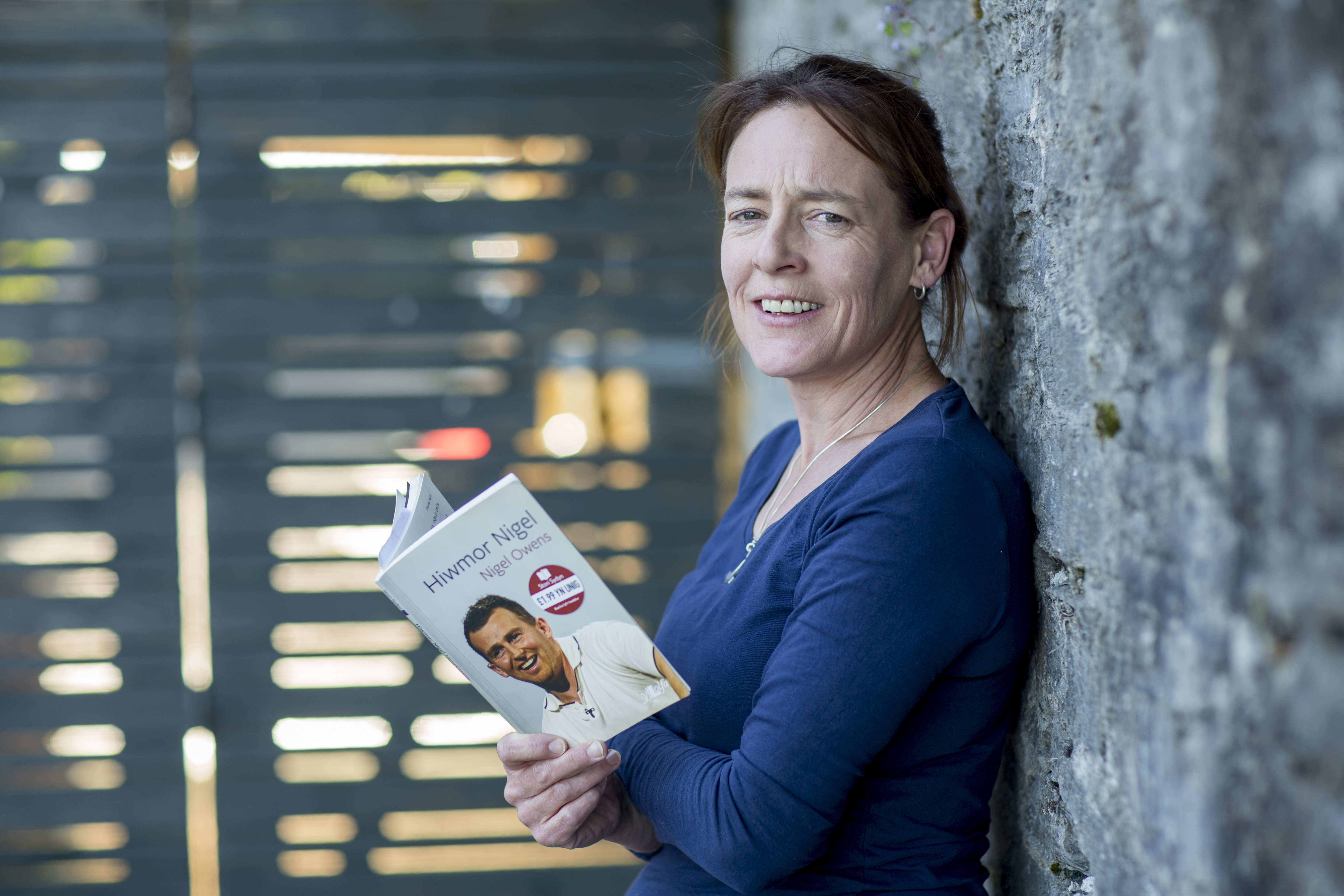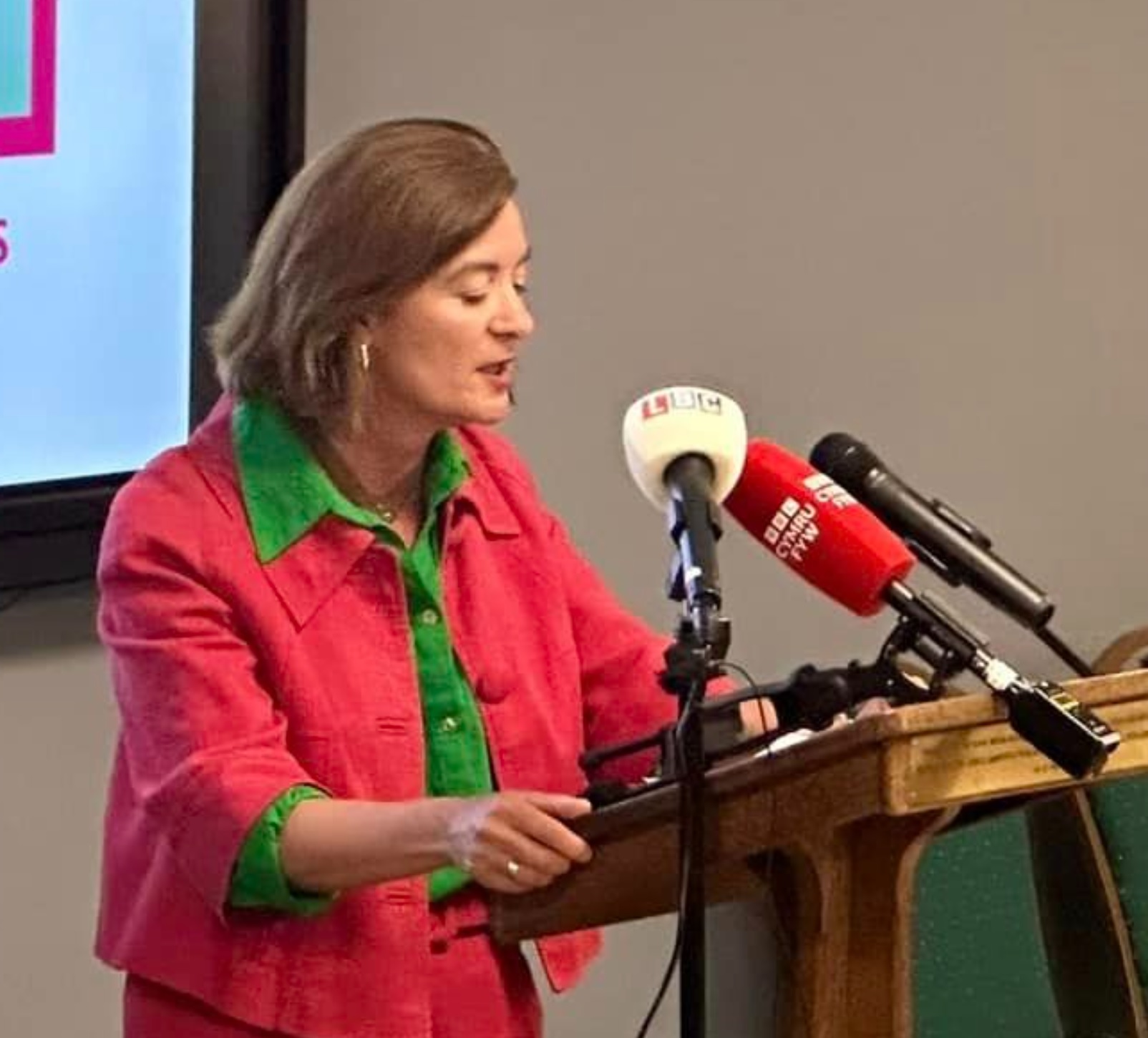News
Learning Welsh helped Pembrokeshire woman integrate

A PEMBROKESHIRE WOMAN feels more connected to her local community after learning Welsh and is now calling on others to do the same as part of Adult Learners’ Week.
Ailinor Evans, 48, from Cilgerran in Pembrokeshire, started learning Welsh three years ago as she wanted to feel a part of her local community. Ali, who grew up in the area in a non-Welsh speaking family, moved away when she was 16, and lost any Welsh that she had learnt when she was younger. It wasn’t until she moved back 19 years later that she felt the need to pick the language back up again.
However, as a busy working mother the time never felt right to dedicate the time to learn Welsh. In 2015 after being made redundant she started working at the Pembrokeshire Housing Association now called ateb Group.
The organisation offered free lunchtime Welsh classes as part of its Welsh language policy, Ali took the opportunity and hasn’t looked back since. Ali soon found one hour a week wasn’t enough and she wanted to progress more quickly, so she took the leap and began an evening class. She is now on her way to gaining her Canolradd/Intermediate qualification next month with the view to taking her Uwch/Advanced certificate in advanced Welsh in the future.
Ali is supporting Adult Learners’ Week 2018 which takes place from June 18-24 2018 to highlight opportunities to continue developing and learning new skills as an adult and celebrate the positive impact of adult education on skills and employability.
Ali said: “I have always wanted to be fluent in Welsh but have felt, until now, that I haven’t had the time to commit to it. When my employer introduced Welsh lessons that were held in the room next door to my office I felt that I didn’t have an excuse any more.
“I live in a rural community where about 60% of people speak fluent Welsh. I have never been made to feel unwelcome but I was keen to learn as much Welsh as I could to be fully integrated in the community. The majority of our local businesses, shops, pubs and cafes operate in Welsh so I have loved being able to hold a conversation and go about my daily tasks with the confidence that I can speak in Welsh.
“Learning Welsh has also benefitted me at work. My role involves me speaking to tenants to find out if they have any concerns or issues that they want to raise and it is nice that they can speak to me in Welsh if that is the language they feel more comfortable in. My employer has been really supportive of my learning journey and allows me the time to study and the time to take any exams.
“I would encourage anyone thinking about learning Welsh to do it. If you don’t want to commit to an evening course, there are lots of less intensive options for you to try first. Many local communities hold coffee mornings or will team you up with a local mentor where you can meet up and chat in Welsh together. The Welsh language community is very supportive and will encourage learners as much as they can.”
Adult Learners’ Week 2018 is running from June 18-24 and celebrates lifelong learning, whether work-based, as part of a community education course, at college, university or online. Now in its 27th year, it aims to promote the range of courses available to adult learners, from languages to computing or childcare to finance.
Eluned Morgan, Minister for Welsh Language and Lifelong Learning, said: “We often think of education as something we do when we’re young, but learning is a lifelong activity.
“Ali is a perfect example of someone who has benefited from the decision to learn Welsh as an adult. The Welsh language belongs to us all, and whatever your age it’s never too late to start learning. There are more opportunities than ever before for people of all ages to start learning Welsh, whether at school, college, or as an adult. Every person who takes up the opportunity to learn our language will help towards our ambitious target of one million Welsh speakers by 2050 who will embrace the language and use it in all contexts.
“We hope Adult Learners’ Week will inspire people of all ages across Wales to find out more about how they can develop their skills. Skills Gateway for Adults also offers a range of careers advice and guidance for anyone looking to improve their skills and employability or get back into work.”
David Hagendyk, Director for Wales at Learning and Work Institute, said: “Going back into education has enormous benefits for adults. The evidence shows that it can improve your health, family life, the chance of a job, or a promotion at work. Taking that first step back into adult education might seem a little daunting at first but there is always someone to lend a helping hand and to support you along the way.
“Adult Learners’ Week has been running in Wales for 27 years and has helped hundreds of thousands of adults right across the country. It’s a great time to take the plunge to learn a new skill, meet new people and learn about something you have always been passionate about. With the world changing so quickly around us it is more important than ever that all of us are learning throughout our lives. Now is the perfect time to start.”
Adult Learners’ Week is funded by The Welsh Government and the European Social Fund and organised by the Learning & Work Institute Wales.
For more information on Adult Learners’ Week, go to www.careerswales.com/
For more information on Welsh courses, please go to learnwelsh.cymru
News
Paris in February made easy with special direct Air France flights from Cardiff

TRAVELLING to Paris has never been simpler for Welsh holidaymakers, with Air France launching a series of special direct weekend services from Cardiff Airport to the French capital this month.
The limited-period flights offer a convenient, non-stop journey of under two hours to Paris, giving passengers more time to enjoy the city’s culture, cuisine and famous landmarks without the hassle of connections or long road transfers to other UK airports.

Timed perfectly for winter city breaks and Valentine’s getaways, the services run between February 13 and February 16, making them ideal for long weekends.
February is widely considered one of the best times to visit the French capital, with fewer crowds and a relaxed, romantic atmosphere. Visitors can explore world-famous attractions including the Eiffel Tower, the Arc de Triomphe and Notre-Dame Cathedral, browse galleries at the Louvre and Musée d’Orsay, or simply enjoy cafés, bistros and Michelin-starred dining across the city.
With Valentine’s Day falling during the operating period, the flights offer couples an easy escape for scenic walks along the Seine, memorable meals and classic Parisian experiences.
Jon Bridge, CEO of Cardiff Airport, said: “We’re delighted to offer direct flights to such a vibrant city for Valentine’s weekend. Cardiff Airport is expanding its reach, giving customers an easy, friendly travel experience and fantastic options. We’ve listened to passenger demand and are excited to make this opportunity possible, with more to come from Cardiff.”
Seats are available now via airfrance.co.uk and through travel agents. As availability is limited, early booking is recommended.
Flight schedule
Cardiff (CWL) to Paris (CDG)
• Feb 13 – AF4149 – 6:20pm → 8:50pm
• Feb 14 – AF4149 – 3:20pm → 5:50pm
• Feb 15 – AF4149 – 9:20am → 11:50am
• Feb 15 – AF4151 – 9:00pm → 11:30pm
• Feb 16 – AF4149 – 9:20am → 11:50am
• Feb 16 – AF4151 – 5:50pm → 8:20pm
Paris (CDG) to Cardiff (CWL)
• Feb 13 – AF4148 – 5:00pm → 5:30pm
• Feb 14 – AF4148 – 2:00pm → 2:30pm
• Feb 15 – AF4148 – 8:00am → 8:30am
• Feb 15 – AF4150 – 7:40pm → 8:10pm
• Feb 16 – AF4148 – 8:00am → 8:30am
• Feb 16 – AF4150 – 4:30pm → 5:00pm
Education
Language commissioner launches probe into school closure impact on Welsh

THE WELSH Language Commissioner has launched a formal investigation into claims that the proposed closure of a rural Carmarthenshire primary school did not properly assess the impact on the Welsh language.
Campaign group Cymdeithas yr Iaith confirmed this week that the Welsh Language Commissioner will examine whether Carmarthenshire County Council complied with its legal duties when producing a language impact assessment linked to plans to close Ysgol Llansteffan.
The council issued a statutory notice last year proposing to shut the village school at the end of the summer term as part of wider education reorganisation. A final decision had been expected this spring.
However, the investigation now creates fresh uncertainty over the timetable.

Complaint over ‘insufficient assessment’
Cymdeithas yr Iaith says it submitted a formal complaint arguing that the council failed to produce a sufficiently detailed assessment of how the closure could affect Welsh-medium education and the wider Welsh-speaking community.
The group claims the authority selectively used data to support closure rather than examining all available evidence objectively.
Two key concerns were raised.
Firstly, campaigners argue there may not be enough places in neighbouring Welsh-medium schools to accommodate pupils from Llansteffan and nearby housing developments, potentially forcing some families into English-medium provision.
Secondly, they say the assessment did not meaningfully consider the school’s role as a community hub or explore ways the site could generate income and support local Welsh-language activities.
On behalf of local members, Ffred Ffransis said: “There will not be places for all the Llansteffan children, nor for the children of the new housing estates, in other Welsh-medium schools in the area.
“The most cost-effective way of providing sufficient places locally in Welsh-medium education is by keeping open Ysgol Llansteffan and making better use of the buildings, including environmental education and community use.”
Formal investigation
In a letter to the group, the commissioner confirmed an investigation will be held under Section 71 of the Welsh Language Measure to determine whether the council complied with Welsh language standards.
The probe could take up to three months.
Campaigners believe this may delay implementation of the closure and could require the council to revisit its assessment and potentially carry out a fresh statutory consultation.
Ffransis said: “Even if the council now decided to make a full and meaningful assessment, there would likely have to be a new consultation. The original decision may have been taken on a faulty basis.”
He added that similar concerns had been raised about language impact assessments connected to other proposed school closures in the county.
Council position
The council has previously said that school reorganisation proposals are driven by falling pupil numbers, financial pressures and the need to ensure sustainable, high-quality education.
Authorities across Wales have faced difficult decisions in recent years as rural rolls decline and building maintenance costs rise.
It is expected the council will respond formally to the commissioner’s investigation in due course.
What happens next
If the commissioner finds that language standards were not properly followed, enforcement steps could be taken and the process delayed or revisited.
For families in Llansteffan, the outcome may determine whether their local Welsh-medium school remains open beyond the summer term.
The Herald has contacted Carmarthenshire County Council for comment.
Further updates will follow as the investigation progresses.
Business
First Minister criticised after ‘Netflix’ comment on struggling high streets

Government announces 15% support package but campaigners say costs still crushing hospitality
PUBS, cafés and restaurants across Wales will receive extra business rates relief — but ministers are facing criticism after comments suggesting people staying home watching Netflix are partly to blame for struggling high streets.
The Welsh Government has announced a 15% business rates discount for around 4,400 hospitality businesses in 2026-27, backed by up to £8 million in funding.
Announcing the package, Welsh Government Finance Secretary Mark Drakeford said: “Pubs, restaurants, cafés, bars, and live music venues are at the heart of communities across Wales. We know they are facing real pressures, from rising costs to changing consumer habits.
“This additional support will help around 4,400 businesses as they adapt to these challenges.”
The announcement came hours after Eluned Morgan suggested in Senedd discussions that changing lifestyles — including more time spent at home on streaming services — were contributing to falling footfall in town centres.
The remarks prompted political backlash.
Leader of the Welsh Liberal Democrats, Jane Dodds, said: “People are not willingly choosing Netflix over the high street. They are being forced indoors because prices keep rising and wages are not.
“Blaming people for staying at home is an insult to business owners who are working longer hours just to survive.”
Industry groups say the problem runs deeper than consumer behaviour.
The Campaign for Real Ale (CAMRA) welcomed the discount but warned it would not prevent closures.
Chris Charters, CAMRA Wales director, said: “15% off for a year is only the start. It won’t fix the unfair business rates system our pubs are being crushed by.
“Welsh publicans need a permanent solution, or doors will continue to close.”
Across Pembrokeshire, traders have repeatedly told The Herald that rising energy bills, wage pressures and rates — rather than a lack of willingness to go out — are keeping customers away.
Several town centres have seen growing numbers of empty units over the past year, with independent shops and hospitality venues reporting reduced footfall outside the main tourist season.
While ministers say the relief balances support with tight public finances, business groups are calling for wider and longer-term reform.
Further debate on rates changes is expected later this year.

-

 Health6 days ago
Health6 days agoConsultation reveals lack of public trust in health board
-

 News7 days ago
News7 days agoCaldey still unsafe, survivors warn — despite Abbey’s reform claims
-

 Community7 days ago
Community7 days agoPembrokeshire students speak at national Holocaust Memorial Day event
-

 News18 hours ago
News18 hours agoPrincess of Wales visits historic Pembrokeshire woollen mill
-

 News7 days ago
News7 days agoKurtz raises Gumfreston flooding in the Senedd as petition deadline nears
-

 Crime5 days ago
Crime5 days agoPembroke man accused of child sex offences sent to Swansea Crown Court
-

 Education7 days ago
Education7 days agoAttendance concerns at Milford School reflect wider issue raised at the Senedd
-

 Education7 days ago
Education7 days ago‘Vulnerable teen’ questioned by police at Milford Haven School





























